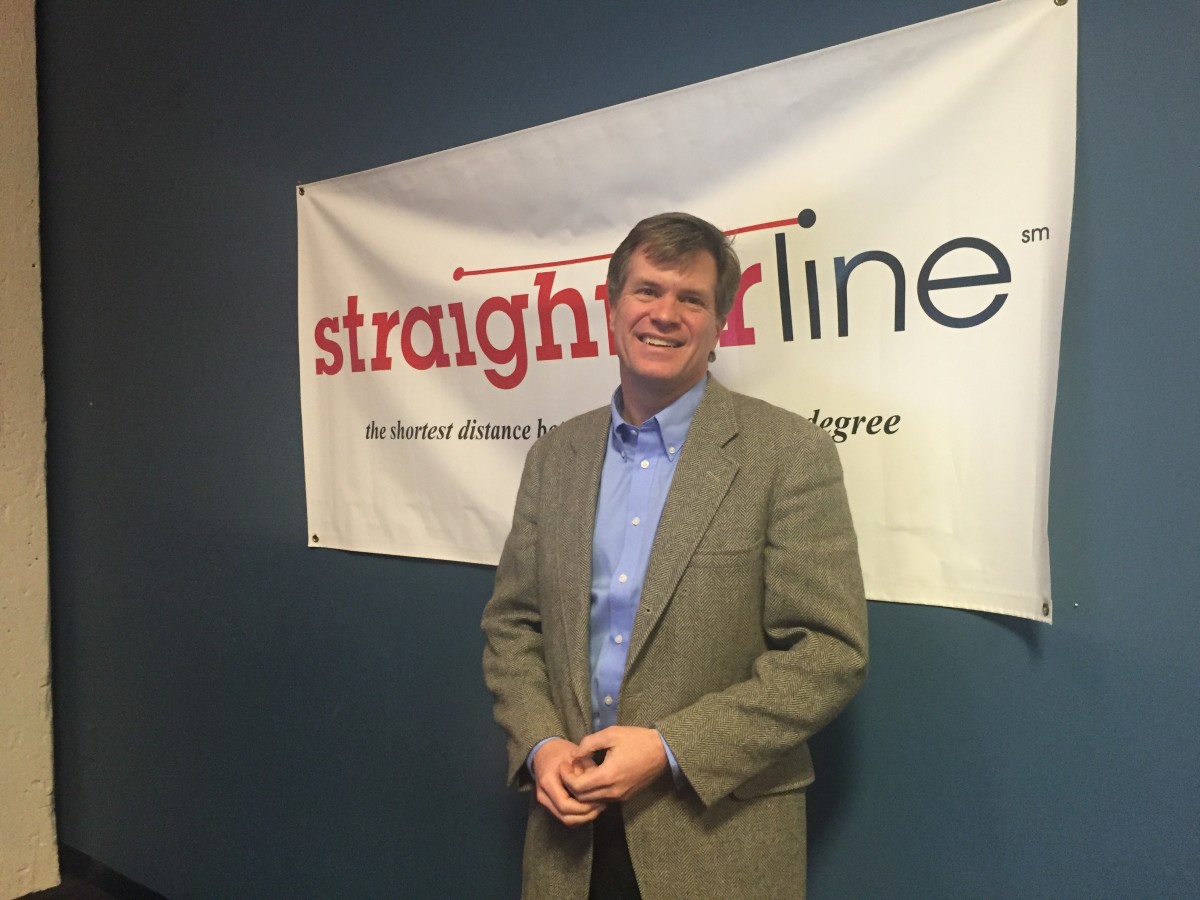When StraighterLine started, the idea of offering online college courses at much cheaper rates than universities was “pretty heretical,” says founder Burck Smith.
When Smith spun the startup out of his previous company, Smarthinking, and moved to Baltimore in 2010, four colleges were signed on as partners. Now the company has 100 colleges signed on, and is growing in its Federal Hill office.
These days, Smith is receiving accolades — such as a place on Forbes’ top 10 higher-ed influencers list. For StraighterLine and others, there’s also national attention and recognition for the model of offering lower-cost online courses to students — a self-paced model of coursework known as “competency-based learning.”
The economics of this industry are on our side.
Over the years, he’s seen “the market moving toward where we were, and then we can present ourselves as a partner who is helping to navigate change rather than the enemy,” Smith said.
This year, the company is setting up for more growth. Last year, StraighterLine hired former Millennial Media exec Kerry Nagle as COO and former Service Source exec Chad McNeal as VP of Strategic Partnerships. This year, the company is looking to hire for a host of other positions to add to its staff of about 50 employees.
“The economics of this industry are on our side. You cannot keep charging for online courses as if they were face-to-face when the cost of delivery is so much less,” Smith said, referring to colleges who see lower-cost courses as a threat to their existence. He cited an oft-quoted study that found that 93 percent of colleges charge the same price for in-person courses as they do for online courses.
Straighterline started as a lightning rod. Months into the company’s existence, an Inside Higher Ed article appeared that detailed a “Revolt Against Outsourced Courses” at Fort Hays State University in Kansas.
Eight years and one validating Inside Higher Ed article later, however, Smith said the controversy was ultimately a good thing.
“While it wasn’t a good way to get partnerships, it was a good way to get attention for a company that wouldn’t have been able to do it otherwise,” Smith said.
Smith said many of the students who take StraighterLine’s classes are “nontraditional” students who are over age 25 and may be going to school part-time, rather than the the 18-year-old who is fresh out of high school and set to go live on campus. In that category, the number of students looking toward online learning is growing. But rather than a replacement for the college education, it looks to offer a bridge.

The company offers the kind of intro and general education courses that populate many institutions’ prerequisites. The company isn’t an accredited institution, but course material has been independently validated, often with college faculty, Smith said.
StraighterLine’s approach is to partner with colleges to offer a lower-cost option to students initially. The students can then use the credits at the university when they enroll. The company makes money from the courses, rather than the institutions. Smith also added that the company does not sell student data.
The material taught in the courses is also designed for students who have other jobs besides going to school. The company maintains a professor option, but many courses are also taught using a different model that allows students to move at their own pace. A mix of tutors and student advisors provides assistance. Known as “competency-based learning,” the U.S. Department of Education has allowed some colleges to offer it without losing financial aid.
For those of us who like to categorize, the direct-to-student strategy makes the company more of a B2C-style edtech company focused on higher education, rather than the B2B-style often seen in K-12 startups that sell to schools and districts.
But there’s precedent for such startups in Baltimore with the Laureate-Sylvan Learning legacy, and StraighterLine has found many of the same benefits that other edtech startups have in the cost of living, proximity to D.C. and growing community.
Since moving from D.C. in 2010, the company has also worked out of edtech-friendly spaces, having moved from ETC’s Eastern campus to the Federal Hill offices that housed Moodlerooms before its exit.
More recently, he pointed to Nagle’s hiring and connecting points like Betamore that have helped connect the company with the city’s tech community.
Going forward, StraighterLine wants to be further involved in the city’s education community, as well as tech. While it has partnerships with Maryland colleges like UMUC and Cecil College, Smith would like to have more partnering institutions in the city. He said city government could also be more supportive of the edtech community, and that doesn’t necessarily require money. Creating more connections between the education and tech communities could help startups get their first few clients, which are often the hardest to get.
“The city could go a long way toward making that happen,” he said.







